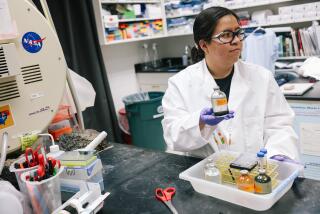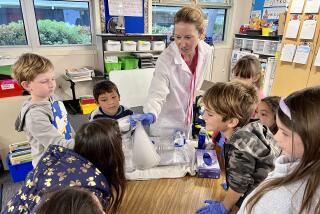CAL STATE NORTHRIDGE : Cultivating Interest in Biology
- Share via
If you ask Cal State Northridge biology professor Nancy Bishop the best way to interest minority high school students in microbiology, she might just tell you to go play in the mud.
On Thursday, Bishop demonstrated her “mud pie” experiment during a workshop that is part of a new five-year program at CSUN called Institutionalizing Student Biology Research Projects.
Funded by a $433,100 grant from the National Science Foundation and a $27,000 grant from the Urban Community Services Program, the project to educate local pre-college teachers to spark minority student interest in science through innovative biology research began this fall.
“This is a special NSF program that’s specially geared to change the whole infrastructure of the way science is taught, especially through hands-on research,” said Steven Oppenheimer, the project’s director and a CSUN biology professor.
About 30 teachers of all grades from across Los Angeles County came to CSUN for Thursday’s workshop, one of about two dozen such workshops the project will host this year. The lecture also featured talks on the NASA Space Science Student Involvement Program and another microbiology demonstration by Dorothy Moote, a high school teacher at Bravo Medical Magnet School.
But it was Bishop’s experiment with mud pies that illustrated how simple it can be to overcome the challenges of educating young students in biological science.
Taking ordinary soil and water, Bishop said students can mix the two into “mud pies” and pack it inside a lid from any clean jar. After placing the mixture in a moist, dark location for a week or two, students will see new, black spots on the mud’s surface--colonies of bacteria from the genus Azotobacter .
“This is a little experiment you can do for children of any age,” Bishop said. “It’s especially fun because you get to make mud pies.”
Many teachers said the demonstrations they learned through the project have already had an effect on their students.
“This is invaluable to teachers,” said Donald Chorzempa, a life science and chemistry teacher at Chatsworth High School. “Everything you learn here you incorporate as part of your bag of tricks.”
More to Read
Sign up for Essential California
The most important California stories and recommendations in your inbox every morning.
You may occasionally receive promotional content from the Los Angeles Times.













